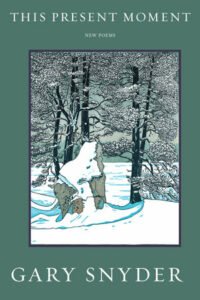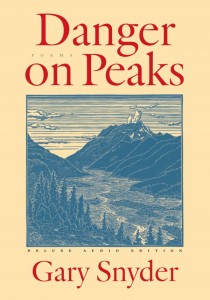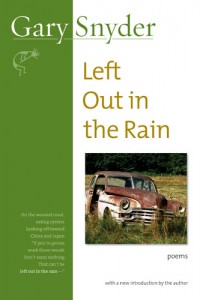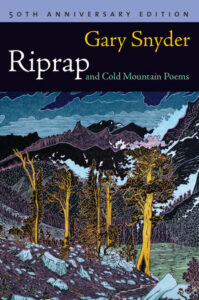Gary Snyder
Gary Snyder is the author of more than twenty collections of poetry and prose. Since 1970 he has lived in the watershed of the South Yuba River in the foothills of the Sierra Nevada. Winner of the Pulitzer Prize in 1975, Snyder has also been awarded the Bollingen Prize for Poetry and the Robert Kirsch Lifetime Achievement Award. His 1992 collection, No Nature, was a National Book Award finalist, and in 2008 he received the Ruth Lilly Poetry Prize. Snyder is a poet, environmentalist, educator and Zen Buddhist.
Subscribe to our newsletter for news & events from Counterpoint Press.
Books
A Place in Space
Ethics, Aesthetics, and Watersheds
In this classic collection of 29 pieces that span half a century, Gary Snyder explores humans' complex, ever–evolving attitudes toward the environment. He argues that nature is not separate from humanity, but intrinsic to it, and that since societies are natural constructs, it's imperative to go beyond racial, ethnic, and religious identities to find a shared concern for acts that benefit humans and nonhumans alike. Included in the collection is his 1971 environmental manifesto "Four Changes," which, as he writes in a postscript, is unfortunately truer than ever. In this new edition, Snyder sends out a call–to–action that challenges all beings to take moral responsibility, a call that resounds with readers discovering the book for the first time or those returning to an old favorite.This Present Moment
New Poems
"This present momentThat lives on
To become
Long ago."
For his first collection of new poems since his celebrated Danger on Peaks, published in 2004, Gary Snyder finds himself ranging over the planet. Journeys to the Dolomites, to the north shore of Lake Tahoe, from Paris and Tuscany to the shrine at Delphi, from Santa Fe to Sella Pass, Snyder lays out these poems as a map of the last decade. Placed side–by–side, they become a path and a trail of complexity and lyrical regard, a sort of riprap of the poet's eighth decade. And in the mix are some of the most beautiful domestic poems of his great career, poems about his work as a homesteader and householder, as a father and husband, as a friend and neighbor. A centerpiece in this collection is a long poem about the death of his beloved, Carole Koda, a rich poem of grief and sorrow, rare in its steady resolved focus on a dying wife, of a power unequaled in American poetry.
As a friend is quoted in one of these new poems:
"I met the other lately in the far back of a bar,
musicians playing near the window and he
sweetly told me "listen to that music.
The self we hold so dear will soon be gone.""
Gary Snyder is one of the greatest American poets of the last century, and This Present Moment shows his command, his broad range, and his remarkable courage.
Danger on Peaks
Poems
When first published in 2004, Danger on Peaks was the poet's first new collection of poems in twenty years. Perhaps his most personal, autobiographical collection, it begins with the young poet ascending Mt. St. Helens in 1945, a climb accidentally timed with the bombing of Hiroshima and Nagasaki. He was 15 years old. Almost sixty years later, after the great Buddhas at Bamiyan Valley were bombed and with the victims of the World Trade Center also "turned to dust," the poet composed a prayer while at Short Grass Temple in Senso–ji, a pilgrim on the path of Kannon, Goddess of Mercy.This remarkable collection was greeted with broad praise, and as Julia Martin proclaimed, "Moving between relative and absolute ways of seeing, [Snyder] responds to the experience of global conflict and personal pain by reminding readers of the continuity of wildness, affirming the value of art, and invoking an ancient practice of wisdom and compassion."
Distant Neighbors
The Selected Letters of Wendell Berry and Gary Snyder
"The letters are valuable for ecologists, students, and teachers of contemporary American literature and for those of us eager to know how these two distant neighbors networked, negotiated, and remained friends." —San Francisco Chronicle"In Distant Neighbors, both Berry and Snyder come across as honest and open–hearted explorers. There is an overall sense that they possess a deep and questing wisdom, hard earned through land work, travel, writing, and spiritual exploration. There is no rushing, no hectoring, and no grand gestures between these two, just an ever–deepening inquiry into what makes a good life and how to live it, even in the depths of the machine age."—Orion Magazine
In 1969 Gary Snyder returned from a long residence in Japan to northern California, to a homestead in the Sierra foothills where he intended to build a house and settle on the land with his wife and young sons. He had just published his first book of essays, Earth House Hold. A few years before, after a long absence, Wendell Berry left New York City to return to land near his grandfather's farm in Port Royal, Kentucky, where he built a small studio and lived there with his wife as they restored an old house on their newly acquired homestead. In 1969 Berry had just published Long–Legged House. These two founding members of the counterculture and of the new environmental movement had yet to meet, but they knew each other's work, and soon they began a correspondence. Neither man could have imagined the impact their work would have on American political and literary culture, nor could they have appreciated the impact they would have on one another.
Snyder had thrown over all vestiges of Christianity in favor of becoming a devoted Buddhist and Zen practitioner, and had lived in Japan for a prolonged period to develop this practice. Berry's discomfort with the Christianity of his native land caused him to become something of a renegade Christian, troubled by the church and organized religion, but grounded in its vocabulary and its narrative. Religion and spirituality seemed like a natural topic for the two men to discuss, and discuss they did. They exchanged more than 240 letters from 1973 to 2013, remarkable letters of insight and argument. The two bring out the best in each other, as they grapple with issues of faith and reason, discuss ideas of home and family, worry over the disintegration of community and commonwealth, and share the details of the lives they've chosen to live with their wives and children. Contemporary American culture is the landscape they reside on. Environmentalism, sustainability, global politics and American involvement, literature, poetry and progressive ideals, these two public intellectuals address issues as broad as are found in any exchange in literature.
No one can be unaffected by the complexity of their relationship, the subtlety of their arguments, and the grace of their friendship. This is a book for the ages.
Danger on Peaks
Poems
When first published in 2004, Danger on Peaks was the poet's first new collection of poems in twenty years. Perhaps his most personal, autobiographical collection, it begins with the young poet ascending Mt. St. Helens in 1945, a climb accidentally timed with the bombing of Hiroshima and Nagasaki. He was 15 years old. Almost sixty years later, after the great Buddhas at Bamiyan Valley were bombed and with the victims of the World Trade Center also "turned to dust," the poet composed a prayer while at Short Grass Temple in Senso–ji, a pilgrim on the path of Kannon, Goddess of Mercy.This remarkable collection was greeted with broad praise, and as Julia Martin proclaimed, "Moving between relative and absolute ways of seeing, [Snyder] responds to the experience of global conflict and personal pain by reminding readers of the continuity of wildness, affirming the value of art, and invoking an ancient practice of wisdom and compassion."
Left Out in the Rain
Poems
“The reading is something like archeology, sifting the layers that have built up over the years to find the source of a familiar voice . . . Left Out in the Rain shows us the footsteps in the wet meadow grass.” —Los Angeles Times“A fascinating case study and verse autobiography of a man who long ago staked his claim as one of America’s finest poets.” —Boston Herald
When Gary Snyder was in his twenties working as a forester and logger, one of the old loggers told him, “If you’re gonna work these woods, don’t want nothing that can’t be left out in the rain.”
Borrowing the phrase, Left Out in the Rain charts the journeys of the poet from 1947 to 1985. From the mountains and shores of the Pacific Northwest to the city streets of San Francisco, New York, and Kyoto, Snyder’s reflections are as much about the human experience as they are about the environment that encompasses it.
Sensual, sardonic, meditative, epigrammatic, formalist—whatever the subject, tone, or structure, these poems all bear the indelible stamp of a master. A villanelle for Finnish folklore, riffs on the neo–formalist poems trendy in the 1950s, a sestina on the philosophical dilemmas of anthropology and linguistics, a transformation of the third century BC Daoist essay “Discourse on Swords” into a satire on contemporary warlike administrations and governments—the experiments in this collection place Snyder among the most diverse of contemporary poets.
Left Out in the Rain means to include items carefully chosen to outlast the elements and remain useful for years. In his new preface to this edition, Snyder notes, “This complicated gathering of many poems, tight and loose together is like an understory ecosystem of the Old Growth. It needs rain.”
On the wooded coast,
eating oysters
Looking off toward
China and Japan
“If you’re gonna
work these woods
Don’t want nothing
That can’t be
left out in the rain—”
Axe Handles
Poems
In Axe Handles Mr. Snyder reveals the roots of community in the family and explores the transmission of cultural values and knowledge."In making the handle of an axe by cutting wood with an axe the model is indeed near at hand." In exploring this axiom of Lu Ji's, Gary Snyder continues:
I am an axe
And my son a handle, soon
To be shaping again, model
And tool, craft of culture,
How we go on.
This is a collection of discovery, of insight, and of vision. These poems see the roots of community in the family, and the roots of culture and government in the community.
Formally, the 71 poems in Axe Handles range from lyrics to riddles to narratives. The collection is divided into three parts, called "Loops," "Little Songs for Gaia," and "Nets," each containing poems of disciplined clarity. Gary Snyder knows well the great power of silence in a poem, silence that allows the mind space enough to discover the magic of song.
Riprap and Cold Mountain Poems
By any measure, Gary Snyder is one of the greatest poets in America in the last century. From his first book of poems to his latest collection of essays, his work and his example, standing between Tu Fu and Thoreau, have been influential all over the world. Riprap, his first book of poems, was published in Japan in 1959 by Origin Press, and it is the fiftieth anniversary of that groundbreaking book we celebrate with this edition. A small press reprint of that book included Snyder's translations of Han Shan's Cold Mountain Poems, perhaps the finest translations of that remarkable poet ever made into English.Reintroducing one of the twentieth century's foremost collections of poetry, this edition will please those already familiar with this work and excite a new generation of readers with its profound simplicity and spare elegance.

Catapult | Counterpoint | Soft Skull
20 Jay Street #704
Brooklyn, NY 11201
646.926.0805 | contact@catapult.co












